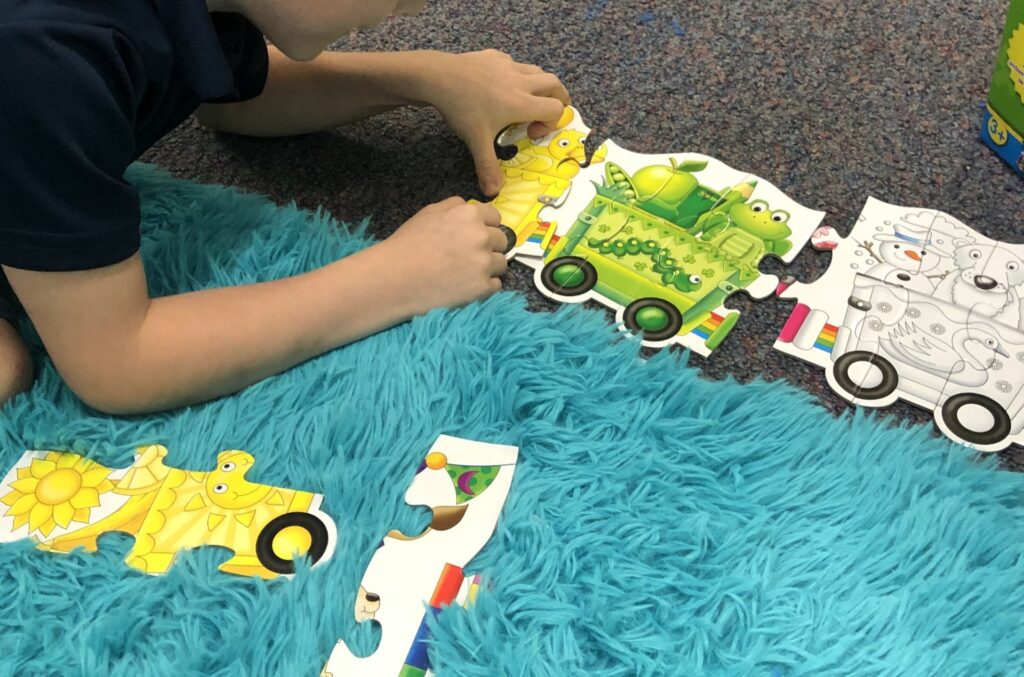
Obstacle course are so fun for kids! But they also help to develop so many different skills. You don’t have to have sensory room space in order to set these up either! Playgrounds, living rooms, classrooms, you name it; there can be some kind of obstacle course there! As a school-based occupational therapist (OT), I’m always thinking about how to work in skill development and practice during play-based activities. Taylor and I mention obstacle courses in our pre-writing development bogs [read them here & here]!
This blog will share a few other skills that can be worked on through obstacle course play!
- Cognitive & Executive Functioning Skills
- Gross & Fine Motor Skills
- Communication & Social Skills
Cognitive & Executive Functioning Skills
Obstacle courses are multi-step activities that require a lot of sequencing and working memory. In school, we think about following multi-step routines in the classroom. Students often need to be working on one thing, while preparing for another or sequencing a whole string of tasks together to complete assigned tasks. Obstacle courses work on these skills in a play-based way! Does your student struggle with impulsivity and self-control? Some of the safety components in obstacle courses require emotional regulation and impulse control/inhibition [always have an adult present!]. Motor planning and praxis [thinking about, planning and executing movement] are all part of obstacle course as well. You can also add academic tasks into obstacle courses like puzzles, flashcards, parts of worksheets, etc. Get creative!
Gross & Fine Motor Skills
Obstacle courses work on all kinds of motor skills! You can use:
- couch cushions in your living room
- sidewalk chalk on the pavement
- the jungle gym at recess
- therapy materials during a treatment session
- a scooter board in the gymnasium
- whatever else you can think of!
I love that obstacle courses are different each time, so students tend to never get tired of doing them! I even have my students create their own! Crawling, jumping, and climbing are commonly part of obstacle courses and are great ways to build strength as students move their bodies through the course. I incorporate lots of puzzles, letter identification/tracing and tong/tweezer tasks into my obstacle courses for an added fine motor challenge. However, the should stability, gross motor planning development, and core/upper body strength that is required for many obstacles also targets underlying skills that are prerequisites for more intimate fine motor development.

Communication & Social Skills
Obstacle course make a great co-treatment session with OT and Speech! Work on language skills like categories by collecting and then sorting puzzle pieces [say one vehicle puzzle and one farm animal puzzle] to the correct boards. Have students work as a team to complete parts of the course. Communication is huge in teamwork! Have students give each other two step directions related to the sequence in which they are to complete the course. My students love to crawl in or throw a tunnel. Changing what they need to do after they get through the tunnel each time is a great way to mix things up and work on other skills!

Prepositions [and other language skills] are all over obstacle courses! Climb OVER the rope to crawl IN the tunnel and wait BEHIND the line for the next direction. Army crawl UNDER the bridge and hop to the RIGHT five times. Socially, kids also work on turn taking, waiting, encouraging one another and sportsmanship by completing obstacle courses!
The possibilities are endless! I can’t wait to hear how you have used obstacle courses to target specific skills with students! Check out my blogs on sensory paths [part 1 & part 2] to get some other ideas on how to incorporate obstacle course-like spaces in your school!







